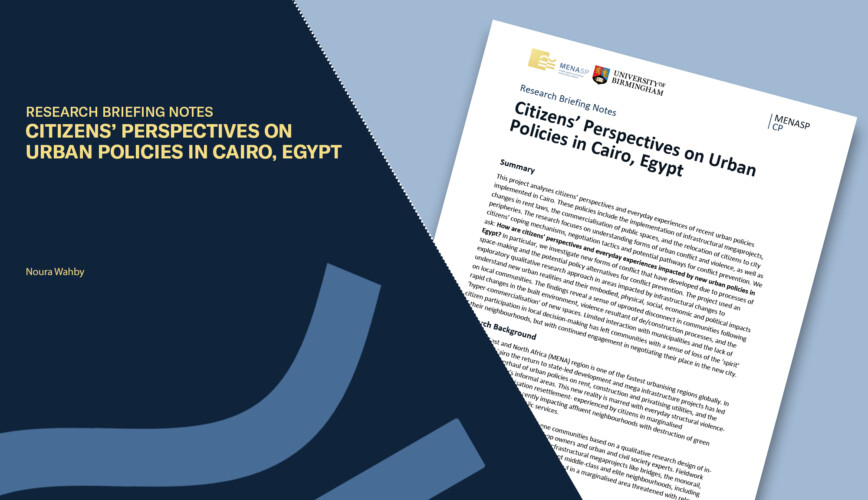This project analyses citizens’ perspectives and everyday experiences of recent urban policies implemented in Cairo. These policies include the implementation of infrastructural megaprojects, changes in rent laws, the commercialisation of public spaces, and the relocation of citizens to city peripheries. The research focuses on understanding forms of urban conflict and violence, as well as citizens’ coping mechanisms, negotiation tactics and potential pathways for conflict prevention. We ask: How are citizens’ perspectives and everyday experiences impacted by new urban policies in Egypt? In particular, we investigate new forms of conflict that have developed due to processes of space-making and the potential policy alternatives for conflict prevention. The project used an exploratory qualitative research approach in areas impacted by infrastructural changes to understand new urban realities and their embodied, physical, social, economic and political impacts on local communities. The findings reveal a sense of uprooted disconnect in communities following rapid changes in the built environment, violence resultant of de/construction processes, and the ‘hyper-commercialisation’ of new spaces. Limited interaction with municipalities and the lack of citizen participation in local decision-making has left communities with a sense of loss of the ‘spirit’ of their neighbourhoods, but with continued engagement in negotiating their place in the new city.
DOI: 10.48352/uobxmenasp.0019
Author: Noura Wahby (Public Policy and Administration Department, American University in Cairo)
This project is supported by the Middle East and North Africa Social Policy Network (MENASP) at the University of Birmingham, in the framework of its ‘strengthening social welfare and security in the MENA region’ research programme, funded by the UK Arts and Humanities Research Council’s Global Challenges Research Fund.
Disclaimer: The opinions expressed in this publication are those of the authors. They do not purport to reflect the opinions or views of the Middle East and North Africa Social Policy (MENASP) Network or the University of Birmingham.
